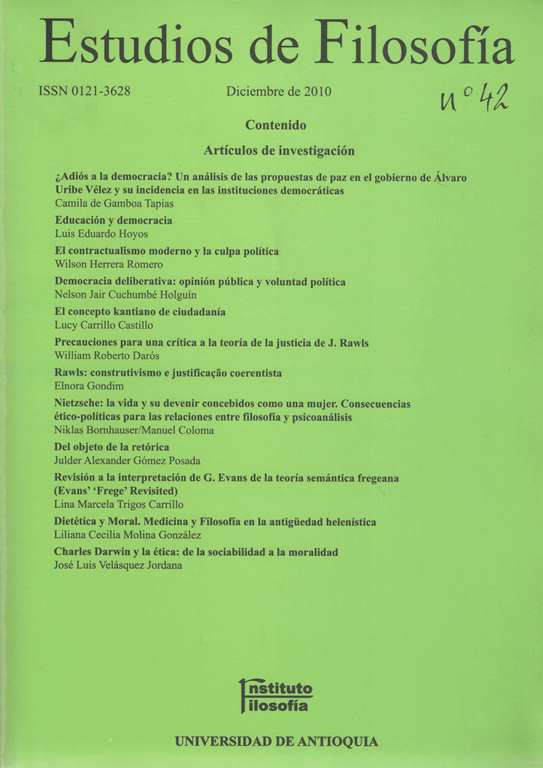Education and democracy
DOI:
https://doi.org/10.17533/udea.ef.11581Keywords:
democracy, self, normativity, citizenship, Álvaro Uribe, educationAbstract
In the paper it is presented a conceptual defense of a liberal and democratic conception of education. Since the main function of individual’s education consists in his socialization and the existence of educated individuals is the minimal guarantee for a social creative and enriched process, then the development of democracy is internally bounded with the development of education in general and of civic education in particular. Therefore the politician, in a democratic system, should be a pedagogue. The reflection, principally conceptual, ends with the presentation of an example of the recent political history of Colombia.
Downloads
References
BRANDOM, R. (1979). Freedom and Constraint by Norms. American Philosophical Quarterly, 16, 187-196.
ELIAS, N. (1987). Die Gesellschaft der Individuen. Frankfurt: Suhrkamp.
HABERMAS, J. (1988). Individuierung durch Vergesellschaftung. Zu George H. Meads Theorie der Subjektivität. En Nachmetaphysisches Denken (págs. 187-241). Frankfurt: Suhrkamp.
HARE, R. M. (1965). Freedom and Reason. Oxford: Oxford University Press. DOI: https://doi.org/10.1093/019881092X.001.0001
HEIDEGGER, M. (1977). Ser y tiempo. (J. Gaos, Trad.) México: Fondo de Cultura Económica.
HOYOS, L. E. (2009). Autoconciencia y autoconocimiento. En Intersubjetividad. Ensayos filosóficos sobre autoconciencia, sujeto y acción. Bogotá: Universidad Nacional de Colombia.
HOYOS, L. E. (2008). Democracia y Universidad. Obtenido de Universidad Nacional de Colombia: http://www.humanas.unal.edu.co/cms.php?id=1557
KANT, I. (1923). Über Pädagogik. Berlin: Walter de Gruyter.
MEAD, G. H. (1992). Mind, Self and Society. Chicago: Chicago University Press.
POSADA CARBÓ, E. (20 de agosto de 2009). ¿Tiranía de opinión? El Tiempo.
TOURAINE, A. (2006). ¿Qué es la democracia? (H. Pons, Trad.) México: Fondo de Cultura Económica.
VALLEJO, C. (1998). Poemas completos. (R. González V., Ed.) Lima: Copé.Yamhure, E. Revista Ahora (2).
Downloads
Published
How to Cite
Issue
Section
Categories
License
Copyright (c) 2010 Luis Eduardo Hoyos

This work is licensed under a Creative Commons Attribution-NonCommercial-ShareAlike 4.0 International License.
Authors who publish with this journal agree to the following terms:
1. The Author retains copyright in the Work, where the term "Work" shall include all digital objects that may result in subsequent electronic publication or distribution.
2. Upon acceptance of the Work, the author shall grant to the Publisher the right of first publication of the Work.
3. The Author shall grant to the Publisher a nonexclusive perpetual right and license to publish, archive, and make accessible the Work in whole or in part in all forms of media now or hereafter known under a Creative Commons Attribution-NoCommercia-ShareAlike (CC BY-NC-SA 4.0), or its equivalent, which, for the avoidance of doubt, allows others to copy, distribute, and transmit the Work under the following conditions: (a) Attribution: Other users must attribute the Work in the manner specified by the author as indicated on the journal Web site;(b) Noncommercial: Other users (including Publisher) may not use this Work for commercial purposes;
4. The Author is able to enter into separate, additional contractual arrangements for the nonexclusive distribution of the journal's published version of the Work (e.g., post it to an institutional repository or publish it in a book), as long as there is provided in the document an acknowledgement of its initial publication in this journal;
5. Authors are permitted, and Estudios de Filosofía promotes, to post online the preprint manuscript of the Work in institutional repositories or on their Websites prior to and during the submission process, as it can lead to productive exchanges, as well as earlier and greater citation of published work (see The Effect of Open Access). Any such posting made before acceptance and publication of the Work is expected be updated upon publication to include a reference to the Estudios de Filosofía's assigned URL to the Article and its final published version in Estudios de Filosofía.















